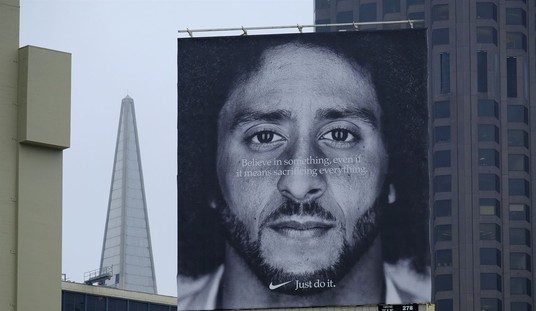The retreat of social media’s biggest mogul continues, but it’s not doing his investors any favors. In a CNN interview last night, Mark Zuckerberg conceded that perhaps his critics are correct, and that Facebook should be more regulated. The CEO then tries to step back from that stepback, arguing that his platform has already committed to forcing more advertiser transparency on its own:
“There are things like ads transparency regulation that I would love to see,” he told CNN. “If you look at how much regulation there is around advertising on TV and print, it’s just not clear why there should be less on the internet.”
“I know a couple of senators are working really hard on this,” he added.
Zuckerberg’s comments were quickly embraced by Senator Amy Klobuchar, who is sponsoring a bill that would place new disclosure requirements on digital political advertisements.
“Just watched Mark Zuckerberg on @CNN & I was surprised to hear him say he supported the senate bill on election ads. That’s my bill — the Honest Ads Act,” Klobuchar, a Democrat from Minnesota, tweeted.
Zuckerberg told Wired that he’s up for some regulation, but not being treated like a common carrier — as Germany threatens to do:
I think when you start getting into micromanagement, of ‘Oh, you need to have this specific queue or this,’ which … is the German model — you have to handle hate speech in this way — in some ways that’s actually backfired. Because now we are handling hate speech in Germany in a specific way, for Germany, and our processes for the rest of the world have far surpassed our ability to handle, to do that. But we’re still doing it in Germany the way that it’s mandated that we do it there. So I think guidelines are probably going to be a lot better. But this, I think, is going to be an interesting conversation to have over the coming years, maybe, more than today. But it’s going to be an interesting question.
He compared it to food safety issues, oddly enough:
So my understanding with food safety is there’s a certain amount of dust that can get into the chicken as it’s going through the processing, and it’s not a large amount—it needs to be a very small amount—and I think there’s some understanding that you’re not going to be able to fully solve every single issue if you’re trying to feed hundreds of millions of people—or, in our case, build a community of 2 billion people—but that it should be a very high standard, and people should expect that we’re going to do a good job getting the hate speech out. And that, I think, is probably the right way to do it—to give companies the right flexibility in how to execute that.
Er … what? Food safety protocols exist because people can sick or die directly from ingesting bad food. That’s absolutely not the case with speech, which is why the First Amendment protects it, and why “hate speech” is still legal within it. Political speech is not a magic incantation that renders people helpless to it, for crying out loud. All of the ways in which treating speech that way end up oppressing other kinds of political speech and turn regulators into censors.
This is why Michael Brendan Dougherty sees something sinister in Zuckerberg’s retreat:
But what troubles me most of all is the way that Mark Zuckerberg, Sheryl Sandberg, and Facebook more generally have publicly reinforced the bizarre framing given to this story by the organs of gentry liberalism. …
Now Mark Zuckerberg says he is planning to ban developers that “misuse personally identifiable information.” What does he even mean by this? The data Gods of Silicon Valley are just making it up as they go along. They are being scapegoated for the populist turn of politics across the West. And while you can pin some blame on them for the way their networks facilitate extremist movements, it was not they who ushered China into the WTO, lowered trade barriers, made a blunder of foreign policy in the Middle East, and led the West into a major financial crisis.
Now countries like Germany and France are demanding help from Silicon Valley in managing public opinion, while intimating strongly that their friendly Irish tax rates might be under threat. Barack Obama has personally lobbied Zuckerberg to do more to censor non-mainstream news sources.
That’s all to be expected. But it is astonishing to watch Zuckerberg play along. The promise to ban those who “misuse” information is basically a promise to act as a better censor and political manager. Watch out.
In other words, there’s a chicken in this story in more than one sense. So far, though, Zuckerberg’s sell-out hasn’t helped with his stock-price woes. Share prices are still dropping today despite Zuckerberg’s attempts to pacify the media, and his worries are highlighted by this look at the share value over the last month:

Why would this public campaign shore up confidence in Facebook? Zuckerberg appears to be going after his own business model, and at least Facebook investors are smart enough to know that. As I explained at The Week, the data that Zuckerberg wants to keep off limits from advertisers is precisely what Facebook has been selling to them all along:
Facebook remains one of the most valuable companies in the world. Where, we might ask, is that value derived? After all, its 1.4 billion daily active users pay nothing for access to the platform, no matter how much they use it. It’s free from top to bottom. The money comes from ads. And Facebook’s entire advantage in selling ads is that because its user base is so big, it can promise advertisers the ability to target virtually any demographic group it wishes. (Want millennial homeowners in Kansas? Facebook surely has them. Retirees in Japan? It has them, too.)
Facebook sells ads based on what it knows about you. That’s its core business. To think otherwise is foolish.
The data is available to third parties, too. In 2007, Zuckerberg opened the Facebook platform to outside developers, who would then write their own applications to interact with users and gain access to their data on a wide scale. And thanks to the network power of friending, these outside parties can sometimes get data not just on those who use the applications, but also on their friends, too. That’s a powerful force multiplier that’s built into the Facebook structure. This is how Cambridge Analytica leveraged 272,000 app users into an entrée to access the personal data of 50 million of their friends. …
The key point is this: When the service is free, you’re not the customer. You’re the product. If you don’t want to be the product, don’t sign up in the first place, or short of that, don’t load a bunch of personal data in the expectations that it will be kept private.
Zuckerberg wants government to put up those barriers — but only a few of them — to prevent advertisers from (a) blaming him and (b) going to a competing platform that will eventually give them what they want. This is basic rent-seeking behavior from a large company. If Zuckerberg wants that data blocked, he can fix it himself tomorrow … but he’d probably want to sell off the rest of his stock first.








Join the conversation as a VIP Member